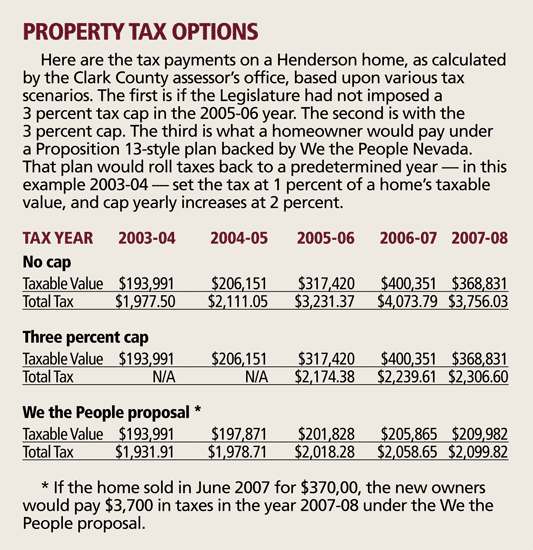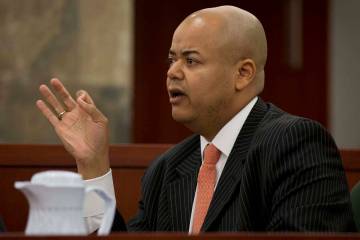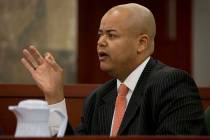Tax caps’ benefits not equal
CARSON CITY -- So what's the better deal for Nevada homeowners:
• Existing legislation that capped property tax increases to a maximum of 3 percent a year on primary residences beginning July 1, 2005?
• Or a proposed Proposition 13-style ballot measure that would roll back home values to some as yet undetermined date even earlier this decade, and then limit increases in property taxes to 2 percent a year?
It might seem at first to be a no-brainer, but Clark County Assessor Mark Schofield said people who continue to buy homes and move up in the housing market may find the measure passed by the Nevada Legislature their cap of choice.
If the California-style Proposition 13 measure is similar to those pushed unsuccessfully in Nevada previously, the benefit of the original property tax savings is lost when a home is resold, he said.
A home valued at $200,000 and taxed at 1 percent under an original owner would owe $2,000 a year in taxes, plus the annual 2 percent increase.
If that home resold a few years later for $400,000, the new owner would pay $4,000 a year in taxes and then receive the benefit of the 2 percent annual cap moving forward.
But under the 2005 legislation, approved to curb a huge run-up in home values, the 3 percent yearly cap that started with the 2005-06 tax year stays with the home even when it is sold, Schofield said.
Those who don't plan to move would probably benefit more under the Proposition 13 proposal, he said.
Young families moving into the market would not benefit under the Proposition 13 plan, he said.
"The buyer enjoys the same level of cap relief that you do," Schofield said.
The sale value of the home has nothing to do with the property tax bill the new homeowner will receive and must pay, Schofield said.
The assessor's office is not taking a position on the Proposition 13 measure, but it will seek to educate residents about the effects of the proposal versus the existing legislation, he said.
Sharron Angle, chairwoman of We the People Nevada, the group planning to circulate the constitutional amendment to implement a Proposition 13 property tax cap in Nevada, said the property tax bill faced by new home buyers is not the deal breaker.
What can be a problem is the uncertainty about what the amount of the property tax bill will be from year to year.
"Our proposal will lock the tax rate in at 1 percent of the home value, and it won't go up more than 2 percent a year," Angle said. "Home buyers won't have to worry about what the Legislature might do every two years."
Under the proposal, existing homeowners would pay 1 percent based on the taxable value of the home for the roll-back year that still hasn't been set yet. For new home buyers, the 1 percent will be based on the sale price.
The current legislatively imposed 3 percent cap affects existing homes.
New homes are assessed on their value by the local government and a property tax bill is computed. Then 3 percent cap then takes effect the following year.
The 3 percent is just for primary residences.
A higher, 8 percent cap applies to all other property.
The property tax abatement for all Clark County property owners this fiscal year -- the amount they will not have to pay in property taxes because of the legislatively imposed cap -- totals $1 billion, Schofield said.
We the People Nevada is now engaged in a fundraising effort to get enough money to hire a professional firm to collect the signatures needed to get its proposal on the ballot.
Two previous efforts, helmed by volunteers, failed to get enough signatures.
It would have to be approved by voters twice, in 2008 and 2010, before the constitutional amendment could take effect.
The group got a boost with a $200,000 contribution from a thus-far unnamed donor. The estimated amount needed is $400,000.
Under the proposal, all property, commercial and residential, would be treated the same.
But Angle said her initiative petition does contemplate an exception for senior citizens, allowing them to transfer their property tax benefits if they move to smaller residences, even if those new homes cost more.
Angle said the constitutional amendment is needed to protect property owners from possible changes in the legislative adopted cap. That cap can be changed, but with the constitutional amendment, voters would have control over the limits, not lawmakers, she said.
Schofield said the Legislature could change the cap, but any repeal or increase in it would be a tax increase and would require a two-thirds vote in both houses of the Legislature, not just a simple majority. That does afford more protection to homeowners, she said.
Carson City Assessor Dave Dawley agreed with Schofield's assessment, saying the benefit from the legislatively imposed tax cap, which started with property tax bills on July 1, 2005, stays with the home even if it is sold.
Under Angle's proposal first-time home-buyers, such as young families looking to get into the housing market, could end up paying dramatically higher taxes than their neighbors and might not be able to afford the home because of the taxes required under a Proposition 13, Dawley said.
"The question is, who are you punishing here," he said. "I think you're punishing young people."
The argument that under Proposition 13 people would know exactly how much taxes they would owe is misleading, Dawley said.
Nevada residents have that same information now under the existing limits, he said.
Schofield also noted that although a Proposition 13 measure for Nevada might prove popular with many voters, especially retirees who do not plan to move, the recent correction in the residential housing market should not provide any ammunition for a property tax revolt.
Even with the downturn in home prices, a correction that is likely to last another nine months to a year, the amount of taxes paid by homeowners under the legislatively imposed 3 percent cap is still far less than if there were no cap, he said.
Home prices would have to shatter to get to levels where the 3 percent cap would result in higher taxes being paid than without the cap, Schofield said.
And even if that happened, the legislation provides for an increase of less than 3 percent, or even theoretically a reduction in the property tax bill, for a home that fit that unlikely scenario, he said.
"Even with the market correction, we are not coming even close to the cap in a vast majority of cases," Schofield said.
Schofield offered one specific example in which a taxpayer in an exclusive Henderson development questioned his tax bill because of the decline in home values.
The home was valued at $400,351 in the 2006-07 year. Because real estate prices have dropped, that value was dropped to $368,831 for the current year.
If the 3 percent cap approved by the Legislature had not been enacted, the homeowner would have had to pay $3,756 in taxes on the lower value, a reduction from the $4,073 he would have had to pay in the prior year.
But with the cap, the homeowner is paying only $2,306 in taxes this year, a savings of $1,449 even with the reduced value.
The homeowner's tax bill went up from last year by $67, even with the lower value, but remains far below what he would have paid without the cap, the analysis shows.






















